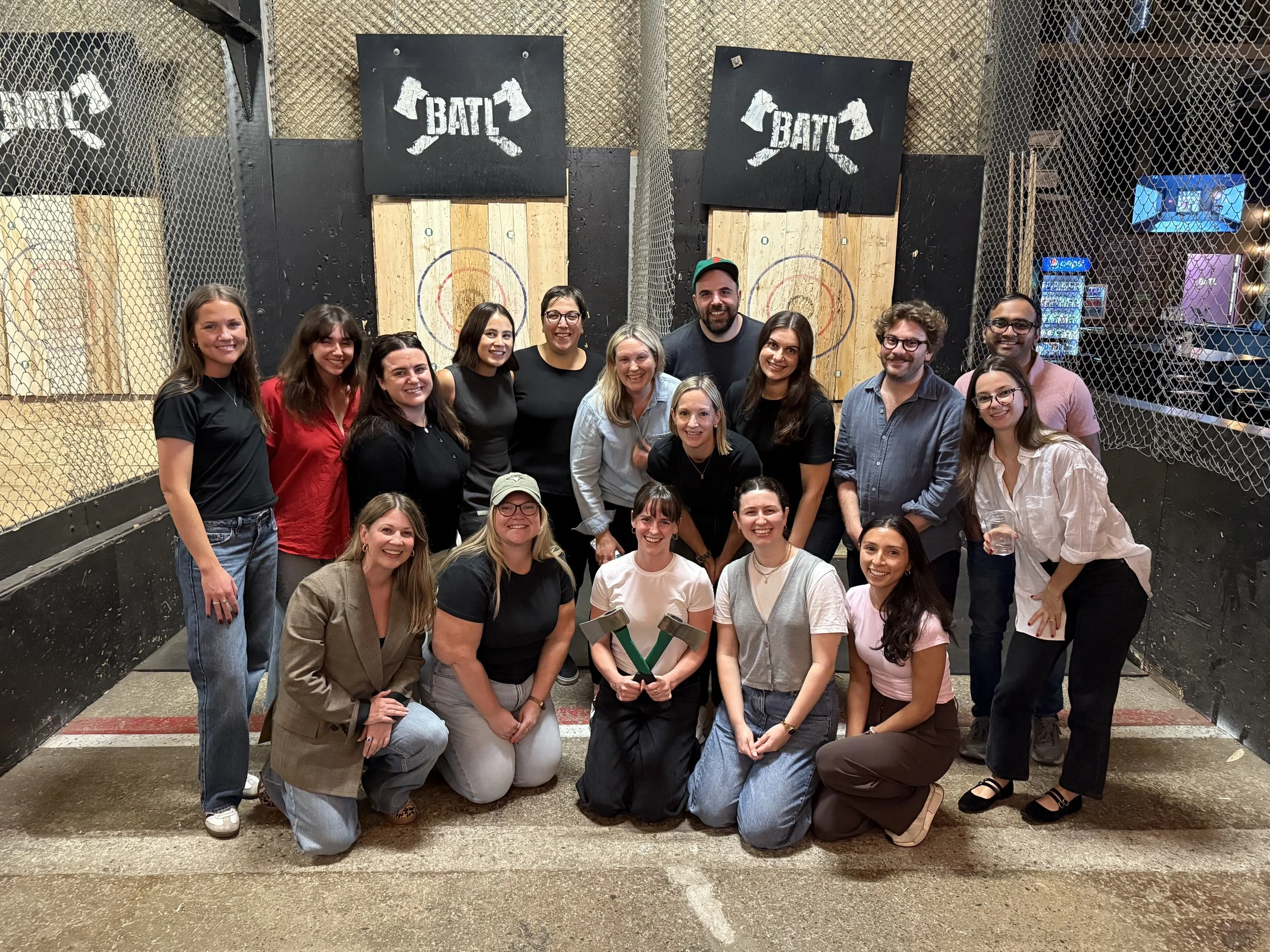Humanizing B2B: Trust, Emotion, and Better Thinking
In an exclusive interview with CanadianSME Small Business Magazine, we sat down with Lena Knight, a senior strategist at Agnostic, where she leads corporate and technology communications for some of Canada’s top CEOs and brands. With over two decades of experience, Lena is reshaping the B2B landscape through Agnostic’s Business-to-People (B2P) framework, reminding us that behind every business decision is a human being influenced by emotions, values, and relationships.
Lena leads Agnostic’s corporate and technology offerings, providing senior counsel to some of Canada’s top CEOs and executives. For more than two decades, she has provided strategic counsel to many of the country’s most beloved brands, developing rich narratives for clients across multiple sectors.
With an inspired ability to help brands connect with people in culturally and personally relevant ways, she offers deep experience building and leading programs that span public advocacy, thought leadership and executive profiling, B2B, financial and technology communications, as well as helping clients navigate through complex issues and crises.
Lena believes in leading with empathy, inspiring her teams through example and building strong relationships that go well beyond the workplace. She empowers her teams to do their very best work to meet each client’s specific goals and objectives.
Your recent research highlights that 60% of business decision-makers acknowledge emotions influence their purchasing decisions. Can you share specific examples of emotional triggers that have proven most effective in B2B contexts, and how Agnostic leverages them to build stronger client relationships?
The most powerful emotional triggers we see are actually quite straightforward: trust, shared values, and genuine partnership. Trust ranks equally with logic at 96%, showing that buyers need confidence that brands will deliver on promises and act with integrity.
But here’s what’s interesting, alignment with company values influences 81% of buyers and a sense of partnership matters to 79%. These aren’t abstract concepts, they’re about whether buyers feel you “get” them and their challenges.
At Agnostic, our Business-to-People (B2P) framework recognizes that behind every purchase decision is a person balancing date with intuition, influenced by colleagues, experts, and even social media. A manufacturing executive making a software decision is the same person scrolling Instagram over coffee and discussing industry trends with peers.
We design campaigns that build trust, reflect shared values, and emphasize partnership. This approach helps create authentic connections and stronger client relationships because business decisions aren’t made by logic alone – they’re made by people.
With trust ranking equally alongside logic in importance for B2B buyers, what actionable trust-building tactics have you found most effective in your B2P (Business-to-People) approach, and how do you measure their impact on long-term business relationships?
Trust-building in B2B starts with transparency.. In our B2P approach, we focus on clear, transparent communication that sets realistic expectations and delivers on them. No overpromising, no corporate speak – just honest conversation about what’s possible and what’s not.
We use storytelling rooted in real client experiences, sharing both challenges and successes. This honesty builds credibility and shows we understand the human side of business.
Demonstrating value alignment is crucial. When buyers see that a brand shares their purpose and ethics, it deepens connection beyond transactions.
For measurement, we look beyond typical metrics. Yes, we track engagement and conversions, but we also monitor relationship indicators. Are clients asking for strategic advice beyond our scope? Do they proactively refer colleagues and industry peers? Are they comfortable sharing internal challenges with us?
The strongest signal is when clients view us as advisors, not vendors. Our B2P framework ensures every interaction reinforces this commitment to their success, not just our own.
As the boundaries between professional and personal digital spaces continue to blur, how should marketing teams adapt their strategies to effectively engage decision-makers who are influenced by both colleagues and friends? What role does authenticity play in this evolving landscape?
The lines between professional and personal have completely blurred. People don’t wake up thinking “I’m consumer B2B content now” – they simply engage with what feels relevant and valuable where they find it.
Marketing teams need to meet buyers where they actually are, not where we think they should be. Our research shows 54% of decision-makers are influenced by colleagues, 44% by industry experts, but also one-third by social media campaigns. That means your content strategy can’t solely rely on LinkedIn or trade publications.
The key is creating content that adds genuine value regardless of where it’s consumed. When an HR director reads your insights on workplace trends, it should be equally valuable whether they found it in an HR magazine or a colleague’s social media share.
Authenticity isn’t optional here – its survival. Decision-makers can instantly spot corporate messaging that feels manufactured. Authentic content acknowledges real challenges, shares genuine insights, and respects the intelligence of your audience. It invites engagement rather than demanding attention.
Brands that show up as helpful experts, not just service providers, builds the kind of trust that influences decisions when it matters most.
Given the rapid shifts in digital behaviors and business purchasing processes, how do you foresee the B2P framework evolving over the next few years? What new challenges and opportunities should small and medium-sized businesses anticipate as they seek to humanize their marketing efforts?
The B2P framework will become even more essential as digital and personal lives blend. With 60% of decision-makers saying emotions influence their buying and social media now impacting one third of B2B purchases, the human element will only grow stronger.
For SMBs, this creates significant opportunities. Smaller businesses have natural advantages in implementing B2P strategies. You can move quickly, speak directly from leadership experience, and maintain consistency across all touchpoints. You can share your founder’s story, showcase your team’s expertise, and respond rapidly to industry developments. Your size becomes a strategic asset when building authentic relationships. Prospects often prefer working with organizations where they can assess decision-makers directly and feel like valued partners rather than account managers.
The challenge is resource allocation. SMBs can’t be everywhere, so focus matters. Prioritize platforms where your audience actually engages, not where you think they should. Invest in creating genuinely helpful content rather than trying to match competitor’s volume.
Technology will help personalize outreach, but since nearly half of buyers balance data and intuition equally, emotional understanding remains irreplaceable.
SMBs that embrace their humanity as a competitive advantage, showing up consistently, will capture significant market opportunities in this evolving landscape.
Finally, what advice would you offer to small and medium-sized businesses striving to create more meaningful, trust-driven connections with their audiences in today’s competitive and emotionally complex marketplace?
Start by recognizing that your buyers are people first, professionals second. They bring their whole selves to business decisions: their values, relationships, and emotional responses don’t disappear when they enter the boardroom.
Focus on building trust through authenticity and transparency. Share honest stories about your challenges and successes. When you’re transparent about your process, acknowledge when something doesn’t go perfectly, and demonstrate genuine commitment to client success, trust naturally follows.
Remember, only 23% of buyers recall B2B marketing that made a strong emotional connection. This isn’t a problem – it’s a massive opportunity. Be the one they remember by creating content the genuinely helps, not just promotes. Align with your audience’s values. Our research shows 81% of buyers care about value alignment. If sustainability matters to your market, show your commitment. If innovation drives your industry, demonstrate thought leadership.
Finally, think long-term relationships, not quick sales. When you respect the full humanity of your audience – their intelligence, their challenges, their goals – you build loyalty that transcends price competition. In today’s market that’s your strongest competitive advantage.






